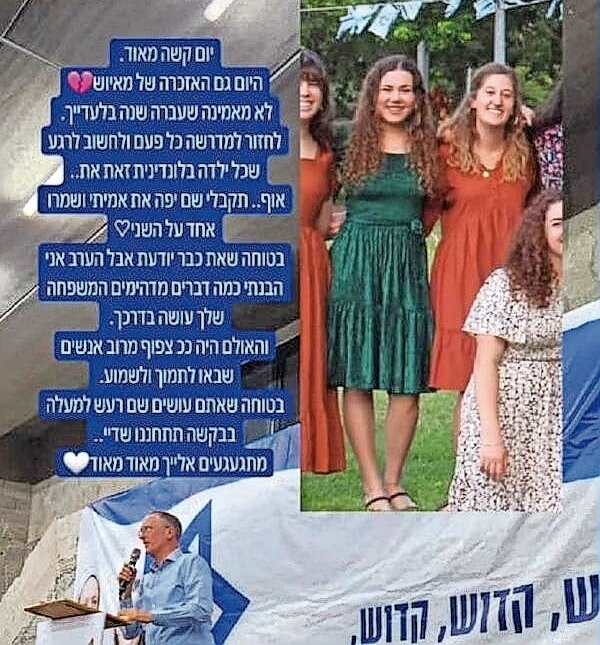My eldest daughter had a hard day on Sunday…
This is not how I grew up
My Eldest daughter had a hard day on Sunday.
First, she went to the funeral of one of the four soldiers who was just killed, 20-year-old Amitai Even-Shoshan, who was a friend of hers. After the funeral, she went to the azkarah commemorating one year since the murder of her friend from midrasha, Maya Dee. These are not the only people she knew personally who lost their lives this past year.
This is not how I grew up. My children are living a very different life than I had.
When I was growing up, the only funerals that I attended were those of my elderly grandparents. In England, it was almost inconceivable that someone I knew would have been killed in a terrorist attack (though not entirely inconceivable, as the IRA bombed my local shopping center). Certainly nobody that I knew was at risk of falling in battle, because nobody that I knew was in the army.
You went to high school, then yeshiva, then university, then a job. The worst thing that might happen would be getting cursed at or punched in the face by an antisemite (which happened to me on several occasions). Nobody was going to be killed or even seriously injured.
When the Hamas war started, I panicked. As a parent, I naturally questioned whether I am doing the right thing by raising my children in dati-leumi society in Israel.
With one exemption, all of the boys that I grew up with either still live in England or are charedi, and none of their children are likely to be facing the dangers and tragedies that mine will. So am I doing right by my children?
Eventually I managed to answer the question satisfactorily for myself. It includes many components, some of which I will address here, and others of which I hope to address in future posts.
Yes, I grew up in a very, very safe environment. But taking Jewish history as a whole, it was a bubble. For nearly four hundred of the past thousand years, Jews were banned from England. And only two generations ago, things had been very different for the Jews in the rest of Europe.
Today, there is no serious threat to life for Jews in England. But you have to keep your head down, and it’s best to wear a hat to hide your kippah. The next district over from Manchester is Rochdale, whose parliamentary representative is an open supporter of Hezbollah and Hamas. And universities in England and the USA can be equally hostile to Jews.
Contrast that with how my children are growing up in Israel. They are so proud and outgoing with their Jewishness. They are involved with the country, with the nation, in every way. They are leading a life that involves youth movements and army or national service. They have met thousands more Jews their age than I ever met.
Their life involves serious challenges and traumatic experiences. But it is such a rich life.
My children are in many ways more developed and capable adults not only than I was at their age, but than I am now! You never know what life will throw at you, wherever and whenever you live — my children are developing the skills and traits for resilience and growth.
And rather than living mundane, Jewishly-repressed lives, they are and will be actively involved on the front lines in the incredible national story of the Jewish People.
Following Oct. 7th, I was worried that I’m forcing my children into a life whose risks they either do not understand, do not want, or cannot imagine a way of avoiding. Then I realized that I was mistaken.
My daughter knows exactly what the risks are, even more than I do. And she knows that there are other ways to live, in the UK, US and in Israel. She knows that she could be in a community in which people don’t worry about whether their children will survive the day.
But she doesn’t want that. She loves her life in Israel, even with its challenges. She loves being able to shout out her Jewishness.
She sits on the train in her IDF religious girls’ uniform and learns masechet Chagiga in memory of Maya and does not need to keep her head down. She understands religious and national responsibility in an incredibly deep way that I didn’t remotely grasp at her age. She knows that she is named after a woman who at her age was in a concentration camp and how significant it is that her great-granddaughter is in the IDF.
This is not how I grew up. And it’s scary and sometimes even alien that my kids are growing up this way. But it’s a way to grow up that most Jews in history could only have dreamed of. And my children are better, stronger people for it.
Rabbi Dr. Slifkin is executive director of the Biblical Museum of Natural History in Beit Shemesh. This article first appeared in his “Rationalist Judiasm” column on Substack.com







